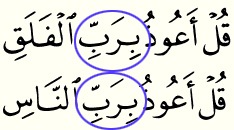A Believer’s Response
Muslims nowadays are easily threatened and enraged when others try to disgrace Islam. Crazy things have happened, from burning stuffs, causing chaos and riots, death threats, to yet another bombs. These are the sort of reactions that we have in response to (among other things) the burning of the Qur’an and/or the Danish cartoon. But is that how we suppose to react?
It is important to mention that these tactics of insulting our Prophet SAW and the Qur’an are not new. These are the continuation of the Quraishi people. The Prophet SAW was insulted and accused of being crazy and insane by them. They did all sorts of psychological attacks to him. Don’t you think it’s familiar? These acts have been mentioned over and over again in the Qur’an. Did the Prophet SAW or any of his followers at that time start to burn things when they insulted him? No. Not really.
The Qur’an has given the Prophet SAW guidance on how to response to these sorts of stupid and ignorant accusations. So be patient with gracious patience [70:5]. That’s exactly how we should response! We should be patient and calm and response them intellectually. We shouldn’t response it the way they want us to response. We shouldn’t pull ourselves into their trap. This is one of their tactics to portray Muslims as barbaric, mindless, and crazy people. They have done every kind of insults that they could ever imagine. Lo and behold, it will keep on coming. We should get used to it by now.
Don’t worry too much about the Qur’an being burnt by these ignorant people. What they (want to) burn is just an ink and paper. The Qur’an is distinct verses [preserved] within the chests of those who have been given knowledge. And none reject Our verses except the wrongdoers [29:49]. If they want to burn the real Qur’an, they have to burn our chests first. Don’t worry about them insulting Allah’s Book, because … the word of Allah is exalted to the heights [9:40]. The world of Allah is supreme and nothing can bring it down. Allah SWT will take care of them later in the Day of Judgment. What we should do right now is to response intellectually and to keep on spreading and representing Islam in a way that the Prophet SAW used to do. We can’t keep on saying “Islam is religion of peace” when our action does not even resemble that of peace! Prove it. Be civil. This is what Allah SWT tells us to do.
The only people who can violate, not do justice to, and be criminals against the Qur’an — more than anyone else — is ironically the Muslims themselves. The Qur’an that is supposedly in the chest of every Muslims has gone from their chests. It has been recited and read over and over again, yet few of us understand what it really means. It has been put and decorated with frames in every house of all Muslims merely as a “protection” or a decoration. We put a big beautiful calligraphy of Surah Al-Asr, which warns us about the limited time we have, yet next to it is a big screen TV in which we use it 8 hours a day. The Qur’an that is supposedly used to remember Allah SWT and to remind us for our actions on this earth is just a piece of decoration that we do not even care about.
Is this how we suppose to treat the Qur’an? Is this how we think about the Qur’an? Is the Qur’an just a piece of decoration that does not have any meanings to us? What about the remembrance to Allah SWT? What about the reminders and the beautiful messages that once moved us? Are they all gone now?
When the Qur’an has been reduced from remembrance to a piece of decoration, this proves to be not only a total disrespect to the Qur’an, but this is also a serious problem for all Muslims — far more serious than those people who tried to burn the copies of the Qur’an. Before we can blame or insult others for disgracing our Book, we first have to look at ourselves. Have we done justice to our very own Qur’an?
Source: A Believer’s Response to the Qur’an Burning Event by Nouman Ali Khan










